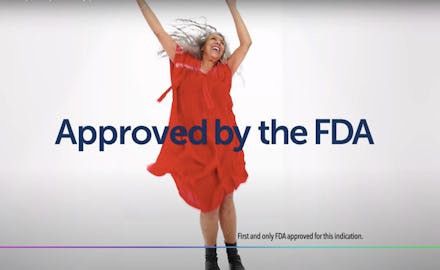The Meghan and Harry special introduced U.K. viewers to the horrors of U.S. health care

It’s hard to imagine how you might configure a Twitter feed that wasn’t inundated with posts about Prince Harry and Meghan and Markle’s splashy sit-down with Oprah by Monday morning. On Sunday, Meghan and Harry bulldozed whatever was left of Buckingham Palace’s squeaky-clean facade for a two-hour special on CBS’s 60 Minutes.
The world recoiled in anger and disbelief right along with Oprah, as Markle unpacked the royal family’s flippant disregard for her mental health, decision to rescind security for her family, and their unshakably racist concerns about baby Archie’s skin tone. While British viewers shared in this shock and awe, they had a separate and novel question on their minds: What’s going on with those American drug commercials?
In a viral Twitter thread, Ayesha A. Siddiqi, a trend forecaster, writer, and editor at The New Inquiry, compiled some of the most baffled responses from British viewers, who aren’t accustomed to such routinely bleak pharmaceutical “adverts” on their own networks. This is more of a legal concern than accounting for taste. As Siddiqi points out in her thread, it’s illegal for UK networks to advertise prescription drugs to the general public, since they're characterized as patients rather than consumers. So shots of old couples lounging in bathtubs and sprawling recordings of side effects and advisories were completely alien to British viewers who’d never seen an American broadcast.
Siddiqi, who splits time between Los Angeles and London, is well-attuned to the differences in viewership habits and quality of healthcare across the Atlantic. Americans have normalized a vampiric, for-profit healthcare system, and the distinction becomes clear in the mundanity of drug company commercials. “For most of my life in this country, Americans — both anecdotally and more officially via the government and media — have operated with an ignorance of how unnecessarily painful and strange this country is,” Siddiqi tells Mic in an email. “Opportunities to remedy that have always stood out to me as valuable because it makes me, as an observer, feel less alone in my reaction, and more importantly establishes the possibility of remedy.”
Harry and Meghan’s interview with Oprah presented a unique scenario for Brits to catch a glimpse of this “primitive, impoverished, and severely lacking” system, as Siddiqi puts it. This was only possible thanks to a few specific conditions: the degrading quality and interest in “event TV” across coasts, a rare chance for prestige gossip on primetime television, and a whole bunch of illegal streaming in the UK, with the interview set to air Monday night on British network ITV. Even for a large chunk of cord-cutting Americans, they were left to rely on a free trial for the network’s relaunched Paramount+, which conveniently debuted just days before the Harry and Meghan interview.
This sort of marketing culture shock provides a valuable chance for Brits and Americans alike to recognize the casually disturbing reality of privatized healthcare. And the ads just scratch the surface, barely gesturing toward how GoFundMe functions as a de facto arm of nationalized healthcare, through desperate attempts to crowdfund medical bills; or young children’s efforts to navigate a sadistic system through lemonade fundraisers are spun up into heartwarming content.
“I feel the more obvious it becomes to Americans that they’ve been conscripted into normalizing what is not in fact normal, and does not need to be, the more political will can be generated towards positive change,” Siddiqi says. “In this case towards healthcare as a human right and not a business.”